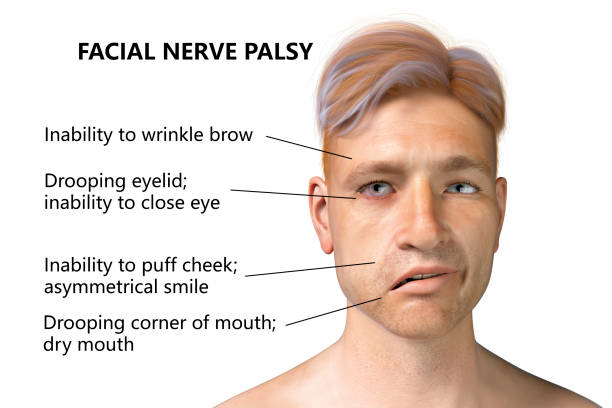Bell’s palsy is a condition that causes temporary paralysis or weakness of the facial muscles. It makes the face droop or become stiff, and it usually occurs on one side of the face. It will also be difficult to close the eyes, and the smiles will be one-sided.
This condition usually results from the inflammation of the nerves that control the facial muscles; the 7th cranial nerve becomes inflamed, compressed or swollen. Bell’s palsy is temporary and usually improves within some weeks, but complete recovery usually takes about 6 months. It can affect people of any age, but it is more common for people between ages 16 and 60. the condition was discovered by Charles Bell, a Scottish anatomist, so it was named after him.
Causes
The major known cause of Bell’s palsy is the inflammation and compression of the seventh cranial nerve, which controls the muscles in the face, the production of tears and signals for taste. Studies have shown that the inflammation of this nerve is usually caused by certain viral infections, including:
- Epstein-Barr virus (mononucleosis).
- Herpes simplex.
- Covid-19.
- Varicella-zoster virus (chickenpox and shingles).
- German measles (rubella).
- Hand-foot-and-mouth disease (coxsackievirus).
- Flu (influenza B).
- Mumps (mumps virus).
- Cytomegalovirus infections.
Other triggers for Bell’s palsy include a weak immune system that results from physical trauma, stress, illnesses, autoimmune conditions, and sleep deprivation.
Symptoms of Bell’s Palsy
The most prominent symptom of Bell’s palsy is paralysis on one side of the face; the affected area will droop, including the forehead, eyebrows, corner of your mouth, eye, and eyelid.
The symptoms of Bell’s palsy tend to start suddenly and then become worse within 48 hours; some people experience mild facial muscle weakness, while others may experience total paralysis in their face. Other symptoms of Bell’s palsy include:
- Dry eyes.
- Drooling.
- Loss of taste.
- Facial pain.
- Ear pain.
- Difficulty speaking, making facial expressions, drinking or eating.
- Sensitivity to sounds (hyperacusis).
- Ringing in your ears.
Treatment
Bell’s palsy usually improves without treatment, but it takes several weeks or months for the facial muscles to recover and repair fully. So, a doctor may recommend medications to help speed up the recovery.
- Antiviral and antibacterial medicine would be prescribed if a virus or bacteria caused the condition.
- Corticosteroids to reduce inflammation.
- Eye drops to keep the affected eye lubricated.
- Pain medications.
Some home remedies that can help relieve the symptoms of Bell’s palsy include
- Facial massage.
- Relaxation.
- An eye patch if the eye is dry.
- Physical therapy to stimulate the facial muscles.
- A warm, moist towel over your face to relieve pain.



